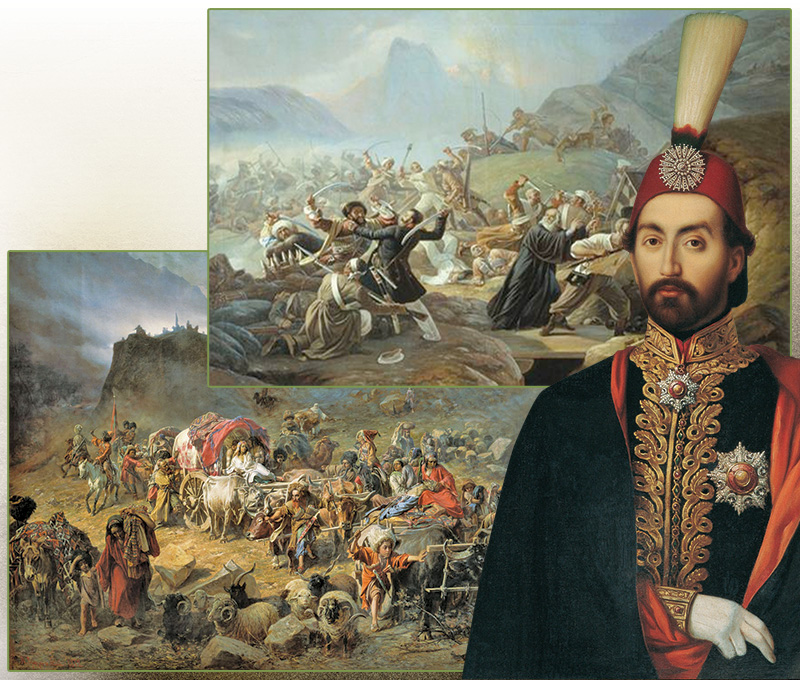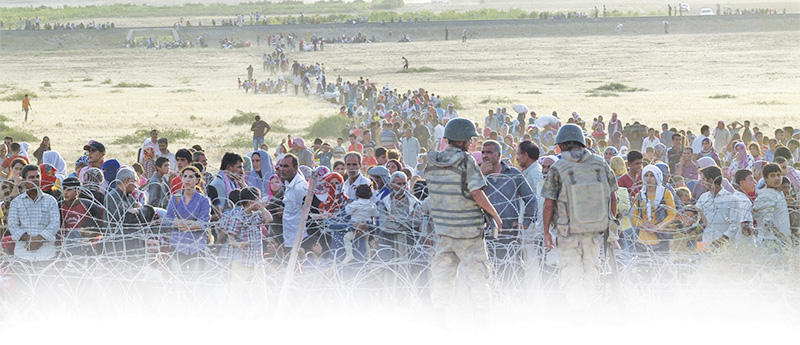 |
With globalization, migration has become one of the most important issues facing the world today. More people than ever are leaving their lands of origin and migrating elsewhere. There are two main reasons for these large population shifts – security and economic worries. In particular, the Arab Spring, which began as totalitarian regimes turning to democracy but soon turned the Middle East into a battleground, has led to a rapid rise in numbers. The majority of people in Syria have sought refuge in neighboring countries in order to escape the fighting inside it.
Turkey has received the greatest share of this migration. According to the Turkish Foreign Affairs Ministry Directorate General of Migration Management, some one million people living in Syria took shelter in Turkey because of Syria's domestic turmoil between April 2011 and May 2014.46 The figure today is estimated to exceed 2 million.47
A 72-page report drawn up by one political party in Turkey has evaluated the impact on Turkey of the crises taking place in Syria and Iraq. The report says that Turkey has spent $5.5 billion from the public purse for Syrian refugees. According to the same report, Turkey has suffered losses of $16.7 billion in four years because of the crises in these two countries. The figure represents expenditure on Syrian refugees, potential export losses and decreased tourism revenues.48
The report evaluates Syrian refugees in strictly economic terms, and regards it as a serious mistake to admit them. However, it is impossible to consider the Syrian refugees who have come to our doorstep, fleeing the terrible humanitarian drama and death in Syria, in terms of statistics and numbers only. The tragedy is a serious one that requires all people of good conscience to help.
It needs to be made clear that Turkey's hospitable attitude toward the Syrians is not the result of any domestic policy or sectarian approach. The greatest proof of that is the fact that Turkey recently admitted Yazidis fleeing from ISIL and previously, Kurds fleeing from Saddam Hussein. Turkey's admission of those in need is therefore nothing new. Similar incidents can be seen in Turkey's more distant past, as well.
 |
Turkish history is a glorious one as the country has hosted refugees under very difficult situations and circumstances. Nearly 2.5 million Circassian people were forced to migrate to Anatolia during the period until the World War I. When Polish immigrants took shelter in the Ottoman Empire, the response of the Ottoman Sultan Abulmajid to Russia, which was demanding the return of these Polish immigrants, was, "I would rather give up my throne than ever send back those who have sought refuge in my state." |
Waves of migration that began with the Crimean Tatars in the 1850s were followed by people living in the Caucasus, particularly Georgians and Circassians, as well as people from Dagestan, Chechens and Laz people moving to Anatolia.49 The migrations of the Crimean Tatars that occurred when Tsarist Russia seized the Crimea in 1783 represented the largest wave of migration. Sporadic wars between the Ottoman Empire and Russia until 1890 were the determining factor in Tatar migration.
The Circassian migration was another mass movement that had results at least as dramatic as that of the Crimean Tatars and that influenced the demographic make-up of Anatolia. Some 2.5 million Circassians were forced to migrate in intervals up to the eve of the First World War. A large part of these migrants, however (approximately one million) lost their lives en route.
Many migrants began arriving from Azerbaijan from the early 19th Century onward. Migration was particularly intense during the years 1877-1878. During the First World War alone, some 10,000 more people migrated from Azerbaijan to Anatolia.50
Georgian migration, which began after the 1828–1829 Ottoman-Russian war continued until 1921. The Albanians first came to Anatolia in 1468, and these migrants were adopted by the Ottoman Empire without being exposed to the least discrimination so much so that 35 of the 215 appointed grand viziers in the Ottoman Empire were Albanians. Today, there are thought to be some five million people of Albanian origin in Turkey.51
Migrants to Turkey do not solely consist of those with close ethnic or religious ties to it. Some 100,000 people migrated from Poland from early 1831 onward following the Kingdom of Poland being made part of Russia, and some of these people reached the Ottoman Empire. The Russians and Austrians vehemently demanded the return of the Polish migrants, but the Ottoman Sultan Abdulmajid rejected these demands, saying, "I would rather give up my throne than ever send back those who have sought refuge in my state."52 The Jews also became Ottomans after they were forced out of Europe.
The 18th Century and afterward, when migration became most intense, was also the time when the Ottoman Empire was suffering from particularly serious economic difficulties. Yet even then, the state never said the migrants were a burden and turned them away. Even in the most difficult of times, the Ottoman people and state tried to help migrants as much as their means allowed.
Migration to Anatolia continued after the demise of the Ottoman Empire and the founding of the Republic of Turkey. Hundreds of thousands of people, Muslim and non-Muslim alike, sought shelter in the Republic of Turkey from Bulgaria, Macedonia, Tatarstan, Chechnya, Kazakhstan and Iran. Even though relations at the national level far from optimal, there are still some 12,000 Armenian migrants living in Turkey today.53
Turkish history is full of examples of exemplary behavior toward refugees. Migrants have never been looked down on or despised. It is, quite bluntly, inhuman to turn migrants away on the grounds they represent a burden. There is no difference between that and telling someone who is running outside because his house is on fire, "Why are you running away? Go back inside!"
No matter what their numbers, the Syrian refugees are the brothers of the Turkish people. From the moment they reach Turkish territory they will all be treated as citizens, be they Sunni, Alawite or Kurd. The Turkish people have a moral responsibility to look after them. The Turkish people will put up with any difficulty, if necessary, in that cause. Turkey will not hand anyone over into the clutches of murderers, because such behavior has no place in Turkish history, in Turkish culture, or in the moral values of Islam.
This article was published in Diplomacy Pakistan:
Related Links:
http://www.diplomacypakistan.com/articles/it-is-no-economic-loss-to-help-syrian-refugees/
Link of Article in English:
http://www.harunyahya.com/en/Articles/203940/it-is-no-economic-loss
Link of Article in Turkish:
http://www.harunyahya.org/tr/Articles/204014/Turkiye’nin-Suriyeli-Gocmenlere-Yardimi-Ekonomik-Bir-Kayip-Degildir
 |
Today, the Turkish Nation has opened their doors and their hearts and provided their every assistance to asylum seekers, just like in the past. This excellent attitude of Turkey has given a great lesson to the world and will not be erased from their memory. |
46 http://www.goc.gov.tr/icerik3/kitlesel-akinlar_409_558_559
47 http://www.iha.com.tr/haber-turkiyede-kac-suriyeli-multeci-var-394712/
48 http://www.al-monitor.com/pulse/tr/contents/articles/originals/2015/04/turkey-iraq-syria-cost-of-crisis-16-billion.html
49 http://www.yazipciziyoruz.biz/index.php?option=com_content& view=article&id=3&Itemid=30
50 Bilgin, "Türk Romanında Savaş Sonrası Anadolu'ya Zorunlu Göçler" Doktora Tezi, T.C. Marmara Üniversitesi Türkiyat Araştırmaları Enstitüsü Türk Dili ve Edebiyatı Ana Bilim Dalı Yeni Türk Edebiyatı Bilim Dalı, İstanbul, 2006.
51 Bakay, Gönül, "İçimizden Biri: Arnavutlar", IV. Kültür Araştırmaları Sempozyumu, İç/ Dış/ Göç ve Kültür, Işık Üniversitesi Şile, İstanbul, 15 – 17 Eylül 2007
52 http://www.polonezkoy.biz/tarih-boyunca-turkiye-polonya-iliskileri. html
53 http://www.hurriyet.com.tr/yazarlar/13837628.asp